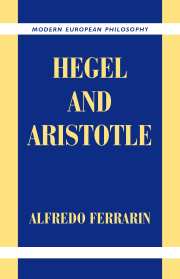Book contents
- Frontmatter
- Contents
- Acknowledgments
- List of Abbreviations
- Introduction
- PART I THE HISTORY OF PHILOSOPHY AND ITS PLACE WITHIN THE SYSTEM
- 1 The Idea of a History of Philosophy
- 2 The Arrangement of the Lectures on Aristotle: Architectonic and Systematic Presuppositions of Hegel's Interpretation
- PART II LOGIC AND METAPHYSICS
- PART III ARISTOTLE AND THE REALPHILOSOPHIE
- PART IV CONCLUSIONS
- Bibliography
- Index
2 - The Arrangement of the Lectures on Aristotle: Architectonic and Systematic Presuppositions of Hegel's Interpretation
Published online by Cambridge University Press: 22 October 2009
- Frontmatter
- Contents
- Acknowledgments
- List of Abbreviations
- Introduction
- PART I THE HISTORY OF PHILOSOPHY AND ITS PLACE WITHIN THE SYSTEM
- 1 The Idea of a History of Philosophy
- 2 The Arrangement of the Lectures on Aristotle: Architectonic and Systematic Presuppositions of Hegel's Interpretation
- PART II LOGIC AND METAPHYSICS
- PART III ARISTOTLE AND THE REALPHILOSOPHIE
- PART IV CONCLUSIONS
- Bibliography
- Index
Summary
All reification is indeed a forgetting.
(T. W. Adorno, Zur Metakritik der Erkenntnistheorie)The Purpose of This Chapter
Hegel presents Aristotle's philosophy in the same order as his own encyclopædic system. After an introduction about Aristotle's biography and the “manner” (Manier) and “idea” of his philosophy, Hegel discusses the Metaphysics; then the Physics and De coelo under the heading of Naturphilosophie; then psychology (De anima and Parva naturalia) and practical philosophy (including ethics and politics) under the heading of Philosophy of Spirit (Philosophie des Geistes); and finally Logic (the Organon).
It is not important to establish whether these headings are Michelet's; they clearly correspond not only to Hegel's order of treatment but also to his intentions as far as the interpretation of the content is concerned (J/G 68–99). Hegel does emphasize that Aristotle did not have a system (VGPh 145 and 244), which means that the correspondence with the order of the Encyclopædia in Hegel's interpretation must not be taken too strongly. Nevertheless, he does stress repeatedly the connection between Aristotle's Metaphysics and his own Logic, between the Physics and his Philosophy of Nature, as well as between the De anima and the Philosophy of Subjective Spirit, and of course between the Politics and objective spirit/Philosophy of Right. For this reason I bring the structure of the Encyclopædia to bear on the arrangement of the Lectures and treat the two together.
- Type
- Chapter
- Information
- Hegel and Aristotle , pp. 55 - 102Publisher: Cambridge University PressPrint publication year: 2001



